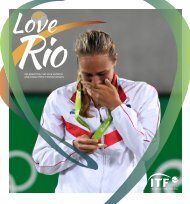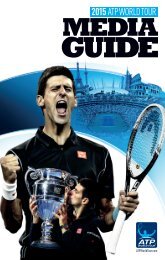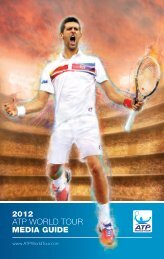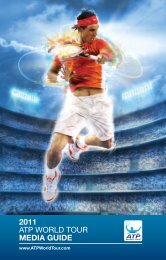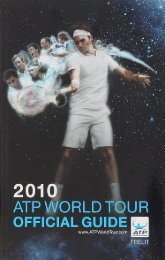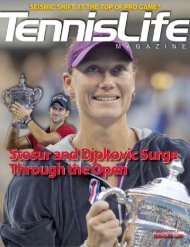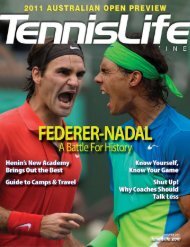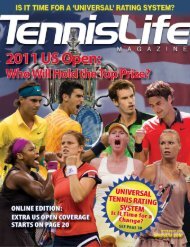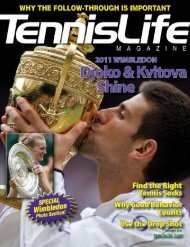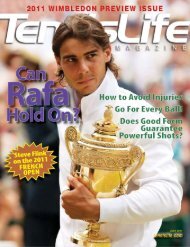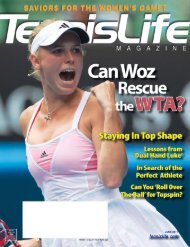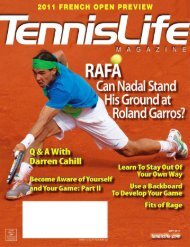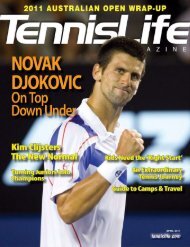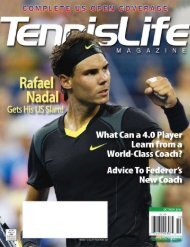A Champion's Mind - Pete Sampras
www.tennismoscow.me Insta:TENNISMOSCOW
www.tennismoscow.me Insta:TENNISMOSCOW
Create successful ePaper yourself
Turn your PDF publications into a flip-book with our unique Google optimized e-Paper software.
A Davis Cup squad has two singles players, a number one and a number two, and a doubles team. The<br />
three-day tie begins on Friday, with two singles (pitting the number one from one nation against the<br />
number two from the other). Saturday is doubles-only day. And on Sunday, the “reverse” singles pits the<br />
number one and number two guys from each nation against each other. A draw determines who plays the<br />
first match (or “rubber”) of a tie, and from there on a formula takes care of the rest.<br />
I was our number one singles player, but the draw determined that France’s number one (Forget) would<br />
open the proceedings against our number two, Andre. I watched from the bench, cheering Andre on as he<br />
took care of business to put us up 1–0. I was impressed and slightly intimidated by the crowd. The place<br />
held just over seven thousand, but it was sold out, so the overall effect was of a huge, deafening crowd.<br />
My moment of reckoning was rapidly approaching; I was up next, the U.S. number one against France’s<br />
number two, Leconte.<br />
What happened was, I froze. It was that bad. It was deer-in-the-headlights-grade paralysis. Notice that I<br />
didn’t say I “choked.” As I wrote before, there is a big difference. Freezing is worse. It prevents you from<br />
getting to that critical point where you can choke (or not).<br />
The score just seemed to fly by, like so many of Leconte’s winners. When I was serving, I’d stand up at<br />
the line and wait, while the crowd was going nuts. I just stood there, absorbing all the karmic energy,<br />
waiting for them to quiet down. That was a big mistake—I should have asserted greater control over the<br />
situation by walking away from the service notch to wait until they calmed down. That would have<br />
represented control, and playing at my pace. It was something I learned in Lyon that would come in handy<br />
in many later matches.<br />
I lost to Leconte in straight sets and left the court shell-shocked. On Saturday, the French won the<br />
doubles to take a 2–1 lead. On the decisive final day, I faced Forget in the first singles match to keep the<br />
U.S. hopes alive. I hadn’t had enough time to process what happened on Friday, or to identify the lessons<br />
from my awful first-day experience. I gave Forget only token resistance as he clinched the Cup for France<br />
in four sets.<br />
I felt terrible afterward. I’d been overwhelmed. For all the talk about Davis Cup being a team thing, I’d<br />
felt very lonely out there—as alone as I would ever feel on a tennis court. Sure, the other guys were right<br />
there on the bench, encouraging me. And you have your captain sitting on court with you so you can talk<br />
and get advice on changeovers. But people make too much of that. It’s not like you can hand your racket<br />
off to a teammate and say, “Hey, I’m struggling with this, how about picking up the slack?”<br />
It was a tense and miserable week. Gus, who was my roommate on the trip, tells me that the night we<br />
lost, we went to sleep pretty early. I woke some hours later, clearly in the throes of some nightmare, and<br />
screamed—at the top of my lungs—Go USA! Then I went back to sleep. I think it was a reaction to the<br />
crowd noise during the tie. I had never been exposed to anything like that, and maybe I just needed to fight<br />
back or assert myself, even if it was just in a dream and too late to matter.<br />
The explanation for this disaster seems simple. I was the wrong man for the job. And to this day,<br />
whenever anyone brings up that tie in Lyon, I just shrug, grin, and tell them “Wrong man for the job.” I<br />
don’t want to blame Gorman, or anyone else, but the one thing that was painfully clear by the end of the<br />
final against France was that <strong>Pete</strong> <strong>Sampras</strong>, a raw youth, was completely unprepared for the demands of<br />
Davis Cup play. He was the wrong man for the job.<br />
There was, however, a personal silver lining. Tim Gullikson, waiting in the wings to take over as my<br />
coach, saw how much I struggled against the French lefties. He felt that I stood too far to my right when I<br />
was receiving serve, exposing too much of my backhand. He wanted me to stand farther to the left to send<br />
the signal that I was looking to touch off a big forehand return. It was a cagey move, because lefties just<br />
love attacking a righty’s backhand, especially in the ad court. The results were remarkable; I think I won<br />
my next thirty-two matches against left-handers after he passed on that tip.<br />
I shudder to think how different my rivalry with Goran Ivanisevic, another lefty, might have turned out



